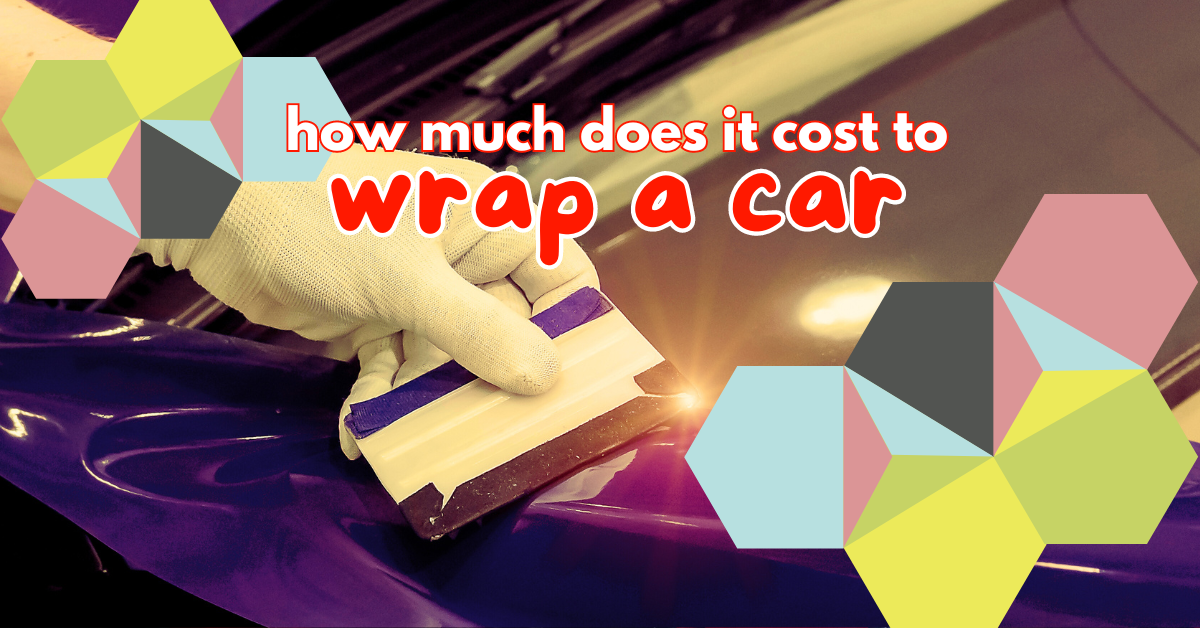Car wraps have become an increasingly popular choice for vehicle owners looking to personalize and protect their cars without committing to a permanent paint job. But how much does it cost to wrap a car? The answer isn’t straightforward, as the price varies depending on several factors. In this comprehensive guide, we’ll explore the cost to wrap a car, the factors affecting the pricing, and whether a car wrap is worth the investment.
1. How Much Does It Cost to Wrap a Car? An Overview of Pricing
The cost of wrapping a car can range anywhere from $2,000 to $5,000 for a full wrap. For partial wraps or smaller cars, prices start around $500 to $1,500. These figures are just rough estimates, as the final price will depend on the type of vehicle, the quality of the vinyl, and the complexity of the wrap design. Custom wraps and specialty materials, like chrome or matte finishes, can push the price up significantly.
Here’s a general breakdown of typical car wrap costs:
- Small Cars (e.g., Coupes and Sedans): $2,000 to $3,000
- Mid-Size Vehicles (e.g., SUVs and Vans): $3,000 to $4,000
- Large Vehicles (e.g., Trucks and Luxury SUVs): $4,000 to $5,000
- Specialty Wraps (e.g., Chrome, Matte, Color Shifts): $6,000 or more
2. Car Wrap Pricing Guide: What to Expect
When considering how much it costs to wrap a car, it’s essential to break down the different types of wraps and what influences their pricing. Car wraps are available in various finishes, including gloss, matte, satin, and textured options. Below is a pricing guide based on different wrap finishes:
- Gloss Finish: The most affordable and commonly used option. Prices range from $2,000 to $3,000.
- Matte Finish: Slightly more expensive due to the unique texture. Costs range from $2,500 to $3,500.
- Satin Finish: Offers a silky appearance and costs around $3,000 to $4,000.
- Textured Finish (e.g., Carbon Fiber): Highly durable but expensive, costing $4,000 or more.
- Chrome Finish: The most premium option, often exceeding $6,000.
Custom Designs and Graphics
If you’re looking for custom graphics or complex designs, expect the price to be higher. Custom wraps usually start at $3,500 and can go up depending on the complexity of the artwork.
3. Factors That Influence the Cost to Wrap a Car
Several factors can affect the total cost of wrapping a car. Understanding these factors will help you budget more effectively:
- Vehicle Size and Type: Larger vehicles like trucks and SUVs require more vinyl and time, increasing the overall cost.
- Vinyl Quality: Premium brands like 3M or Avery Dennison come at a higher price but offer better durability and finish.
- Wrap Complexity: Intricate designs, custom graphics, or wrapping around complex shapes like door handles and mirrors can add to the cost.
- Installation Location: Labor costs can vary depending on your location. Urban areas with high demand may charge more for professional installation.
- Condition of the Vehicle: Older cars with rust or damaged paint may require prep work, which can add to the overall expense.
4. Average Cost for Full vs. Partial Car Wraps
Choosing between a full car wrap and a partial wrap depends on your budget and aesthetic goals. Here’s a quick comparison of costs:
- Full Car Wrap: Covers the entire vehicle and typically costs between $2,500 and $5,000. It’s ideal for complete color changes or custom designs.
- Partial Car Wrap: Covers specific parts, such as the roof, hood, or side panels. Prices range from $500 to $1,500. This option is more affordable and allows for targeted styling.
5. DIY vs. Professional Car Wrapping: Which is Cheaper?
If you’re on a tight budget, you might consider a DIY car wrap. While DIY wrapping kits can cost between $500 and $1,000, this approach comes with several risks:
Pros of DIY Car Wrapping:
- Lower Initial Cost: Cheaper than hiring a professional.
- Creative Control: You can customize your car at your own pace.
Cons of DIY Car Wrapping:
- High Risk of Errors: Wrapping a car requires skill. Mistakes can lead to bubbles, peeling, and poor alignment.
- Time-Consuming: Wrapping a car can take several days, especially for beginners.
- Lower Durability: DIY wraps may not last as long as professional ones.
In contrast, professional car wrapping ensures a flawless finish, better durability, and a warranty, making it a better long-term investment despite the higher upfront cost.
6. Cost to Wrap Different Types of Vehicles
The cost of wrapping a car varies significantly based on the vehicle type and size. Here’s a cost comparison for different types of vehicles:
- Compact Cars (e.g., Honda Civic): $2,000 to $3,000
- Luxury Sedans (e.g., BMW 7 Series): $3,000 to $4,000
- Standard SUVs (e.g., Toyota RAV4): $3,500 to $4,500
- Luxury SUVs (e.g., Range Rover): $4,000 to $6,000
- Pickup Trucks (e.g., Ford F-150): $4,000 to $5,000
7. Car Wrap vs. Paint: Which One is More Cost-Effective?
Car wraps and paint jobs each have their own advantages and price points. Here’s how they compare:
Car Wrap:
- Cost: $2,000 to $5,000 (depending on type and complexity)
- Durability: Lasts 5-7 years with proper care
- Reversibility: Easy to remove without damaging the original paint
Paint Job:
- Cost: $3,000 to $10,000 (for high-quality paint)
- Durability: Permanent, but can fade or chip over time
- Reversibility: Not reversible without repainting
While paint jobs are ideal for a permanent change, car wraps are more cost-effective and versatile, making them a better choice for those who like to change their vehicle’s appearance frequently.
8. How Long Does a Car Wrap Last and What Affects Its Lifespan?
A professionally installed car wrap can last 5 to 7 years with proper maintenance. Several factors can influence its lifespan, including:
- Vinyl Quality: High-quality wraps last longer and resist wear and tear.
- Environmental Exposure: Constant sun exposure can cause fading, while harsh winters can affect the vinyl’s adhesion.
- Maintenance: Regular cleaning and avoiding abrasive materials can extend the life of your wrap.
9. Tips to Save Money on Car Wrapping
Want to wrap your car without breaking the bank? Here are some tips:
- Opt for a Partial Wrap: Wrapping just the hood or roof can be significantly cheaper.
- Choose Standard Finishes: Gloss and matte finishes are more affordable than specialty wraps.
- Look for Promotions: Some installers offer discounts during off-peak seasons.
- Maintain the Wrap Properly: Proper care can prevent the need for early replacement.
10. How to Choose the Right Car Wrap Provider: Key Considerations
Selecting the right car wrap provider is crucial for achieving a high-quality finish and getting the best value for your money. Here are some factors to consider when choosing a car wrap professional:
1. Check Their Portfolio and Experience
Always ask to see the provider’s portfolio or visit their website to check their previous work. This will give you a clear idea of their experience and the quality of their installations. A well-experienced provider will be familiar with handling complex designs and various vehicle types.
2. Read Customer Reviews
Customer reviews can provide valuable insights into the quality of service, professionalism, and satisfaction level of past clients. Look for reviews on trusted platforms like Google Reviews or Yelp. Positive feedback and high ratings are good indicators of a reliable provider.
3. Ask About Warranty and Aftercare
A reputable provider should offer a warranty on the wrap and installation. Warranties typically cover peeling, bubbling, and fading issues. Additionally, ask about their recommended aftercare services to ensure the longevity of your car wrap.
4. Compare Pricing and Services
Get quotes from multiple providers and compare not only the pricing but also the services offered. Some might include extra services like ceramic coating for added protection, which could make a higher price worth the investment.
Choosing the right provider will not only ensure a professional finish but also maximize the lifespan of your car wrap, saving you money in the long run.
11. FAQs: Your Top Questions About the Cost to Wrap a Car
1. How much does it cost to wrap a car completely?
A full car wrap typically costs between $2,500 and $5,000, depending on the vehicle size and wrap quality.
2. Is wrapping a car cheaper than painting?
Yes, wrapping a car is generally cheaper than a high-quality paint job, which can range from $3,000 to $10,000.
3. Can you wrap a car yourself?
Yes, but DIY car wrapping requires skill and can lead to errors. Professional installation is recommended for the best results.
4. How long does a car wrap last?
A well-maintained car wrap can last 5 to 7 years.
5. Can car wraps be removed?
Yes, car wraps are removable and won’t damage the original paint if done properly.
6. Does a car wrap protect the paint?
Yes, car wraps provide a protective layer that prevents minor scratches and UV damage.
7. Are there different types of car wraps?
Yes, car wraps come in various finishes, including gloss, matte, satin, chrome, and carbon fiber.
8. Do car wraps require special maintenance?
Yes, you should avoid abrasive materials and wash the wrap with gentle cleaners.
9. How much does a partial car wrap cost?
Partial wraps cost between $500 and $1,500, depending on the area covered.
10. Is a custom car wrap more expensive?
Yes, custom car wraps with unique designs or graphics typically start at $3,500 or more.
Conclusion: Is Car Wrapping Worth the Cost?
Wrapping your car is an excellent way to change its appearance, protect the paint, and even enhance its resale value. While the initial cost might seem high, the benefits of a car wrap, including durability and customization, often outweigh the expense. By considering factors like vehicle size, wrap quality, and installation location, you can find the right wrap option that fits your budget.
If you’re looking for a versatile and cost-effective way to refresh your car’s look, a car wrap is definitely worth considering!





Pingback: How Much to Wrap a Car: Complete Guide to Car Wrap Costs - My Read Magazine - Everything You Love to Read